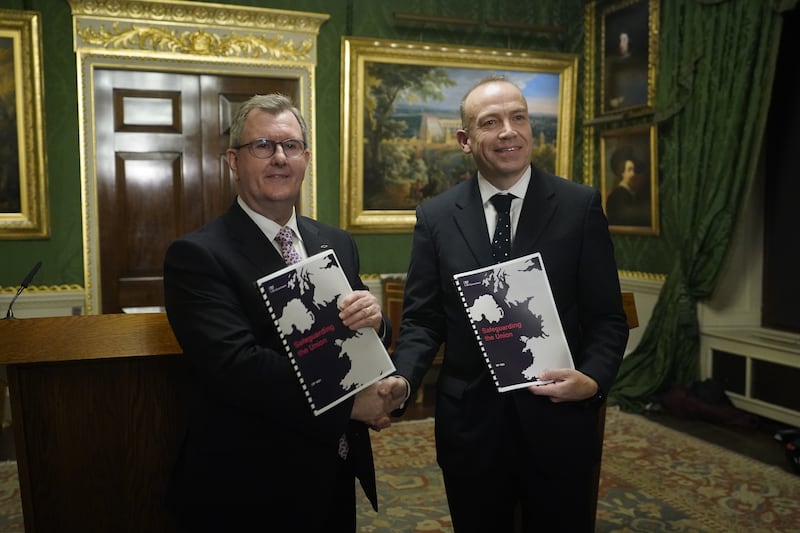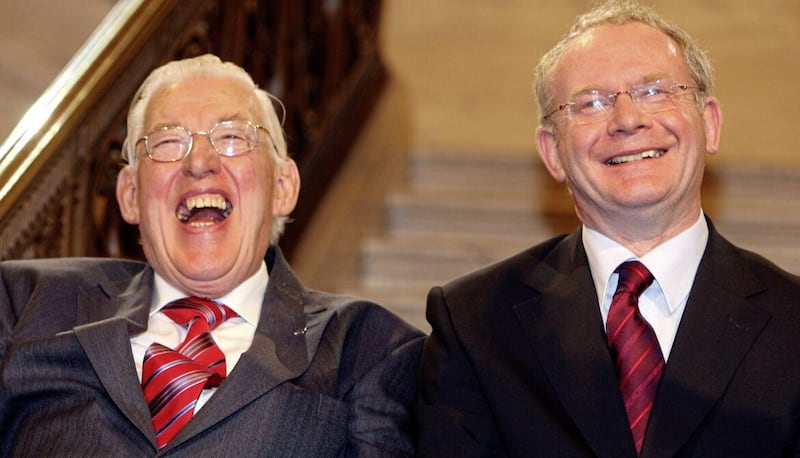Has the restoration of the assembly and executive heralded a new era of civility in Northern Irish politics?
On the surface it certainly appears that way.
The first and deputy first ministers have been setting a positive tone on their visits to a cross-section of community, voluntary, educational and sporting groups. This is to be applauded. Not only does it demonstrate leadership but it also highlights the virtues of political cooperation.
Warm personal chemistry between political leaders is important, though it may take some time to filter down to their grassroots supporters.
For their part, hard-line unionists are still reeling from Sir Jeffrey Donaldson’s acceptance of the Safeguarding the Union deal.

They were among the first to express disquiet at the Irish government’s announcement of €800 million for several large-scale infrastructural projects in Northern Ireland.
Sir Jeffrey has followed suit: “It is not the job or the responsibility of the Republic’s government to provide financial support for the provision of public services and general Northern Ireland infrastructure,” he complained. “That is a matter for the UK.”
More upbeat interpretations of the announcement see Dublin as having finally resourced its policy of supporting balanced accommodation in the north.
Much of the grumbling from hard-line unionist quarters seems to have been triggered by the increase in costs now attached to the redevelopment of the GAA stadium at Casement Park in Andersonstown.

Reports of inflated costs of £150-200m do little to make the prospect of a new stadium more attractive at a time when public finances have been squeezed by inflation.
At root though there is a dearth of positive buy-in from the unionist community. A LucidTalk poll conducted in November last year found that while 54% of people surveyed supported Euro 2028 games being played at a rebuilt Casement Park, 94% of nationalists were in favour while 69% of unionists were opposed.
There are many reasons for this, including the psychological ‘hidden wiring’ still driving a wedge between the two communities.
Unionists need to be honest with themselves about their opposition. Is the Casement Park issue one of fiscal responsibility or political anxiety?
- Time for unionism to catch the Casement vision - Chris DonnellyOpens in new window
- Cahair O’Kane: GAA more than pays its way so stop with the begging bowl narrative around Casement ParkOpens in new window
- Brendan Crossan: Build Casement, scorch the city skyline and make our children dreamOpens in new window
It is worth asking also whether these beliefs are founded on facts or emotion.
Pointing out the zero-sum nature of relations between the two communities is obvious, though it does not help us move forward into a shared future.
What is required is a shift in the mindsets from ambivalence – or, in certain cases, sour sniping – to benevolence.
In other words, we need to move from political partisanship to supporting the universal right of all to access public funding for community projects that aim to improve the health and wealth of everyone in Northern Ireland.

Building on the solid foundations of goodwill, mutual respect and tolerance can lead to positive changes, including a spirit of reciprocity.
No-one doubts that there are serious challenges in community relations.
Some of these challenges have their roots in the unresolved issues of our imperfect peace process, even if the blame has been laid mainly at the door of austerity.
The cost-of-living crisis has impacted disproportionately in low-income areas where people have had to make the tough choices between eating and heating.
It is time unionists put their best foot forward by releasing themselves from this competitive, zero-sum mindset
There are no flags on earth that will give you the same degree of nourishment as a hearty meal and the comfort of a warm home. Nevertheless, local politics continues to emphasise what divides people, rather than what unites them.
It is time unionists put their best foot forward by releasing themselves from this competitive, zero-sum mindset. Only a cooperative, win-win style of politics can cater for everyone at times of socio-economic hardship.
Real civility in political life comes when we extend the hand of friendship and work in collaboration with others to build a better future for all. As the old proverb goes, “one hand washes the other”.







